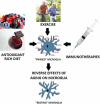Neuroinflammation in the normal aging hippocampus
- PMID: 25772789
- PMCID: PMC4567963
- DOI: 10.1016/j.neuroscience.2015.03.007
Neuroinflammation in the normal aging hippocampus
Abstract
A consequence of normal aging is a greater susceptibility to memory impairments following an immune challenge such as infection, surgery, or traumatic brain injury. The neuroinflammatory response, produced by these challenges results in increased and prolonged production of pro-inflammatory cytokines in the otherwise healthy aged brain. Here we discuss the mechanisms by which long-lasting elevations in pro-inflammatory cytokines in the hippocampus produce memory impairments. Sensitized microglia are a primary source of this exaggerated neuroinflammatory response and appear to be a hallmark of the normal aging brain. We review the current understanding of the causes and effects of normal aging-induced microglial sensitization, including dysregulations of the neuroendocrine system, potentiation of neuroinflammatory responses following an immune challenge, and the impairment of memories. We end with a discussion of therapeutic approaches to prevent these deleterious effects.
Keywords: danger signals; memory impairments; microglial priming; neuroendocrine dysregulation; neuroinflammation; normal aging.
Copyright © 2015 IBRO. Published by Elsevier Ltd. All rights reserved.
Figures


References
-
- Akana SF, Strack AM, Hanson ES, Horsley CJ, Milligan ED, Bhatnagar S, Dallman MF. Interactions among chronic cold, corticosterone and puberty on energy intake and deposition. Stress. 1999;3:131–146. - PubMed
-
- Alzheimer's Association 2014 Alzheimer's disease facts and figures. Alzheimers Dement. 2014;10:e47–e92. - PubMed
Publication types
MeSH terms
Grants and funding
LinkOut - more resources
Full Text Sources
Other Literature Sources
Medical

